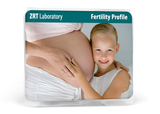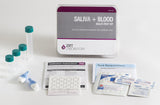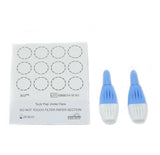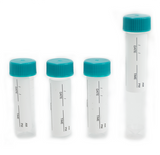The Fertility Test is a comprehensive assessment designed for both men and women to evaluate key hormones associated with fertility. By measuring 15 specific hormones, this test provides valuable insights into reproductive health and hormone balance. The following hormones are analysed:
- Cortisol Morning: This hormone is measured in saliva and indicates cortisol levels in the morning, which can impact fertility.
- Cortisol Noon: Similar to cortisol morning, this hormone is measured in saliva and reflects cortisol levels during the midday period.
- Cortisol Evening: This saliva-based test assesses cortisol levels in the evening, providing information on hormone fluctuations later in the day.
- Cortisol Night: Measured in saliva, cortisol night evaluates cortisol levels during the night, which may affect fertility.
- Estradiol (E2): Also known as estrogen, this hormone is crucial for female fertility and is measured to determine its levels.
- Testosterone (T): An essential hormone for both men and women, testosterone is assessed to evaluate its impact on fertility.
- DHEAS (DS): This hormone, known as dehydroepiandrosterone sulfate, is evaluated to understand its role in fertility.
- Progesterone (Pg): Measured to determine the levels of this hormone, which plays a critical role in female reproductive health and the menstrual cycle.
- Thyroid Stimulating Hormone (TSH): This hormone regulates thyroid function, and its assessment helps identify potential thyroid-related fertility issues.
- Free Triiodothyronine (fT3): A form of thyroid hormone, fT3 is measured to assess thyroid function and its influence on fertility.
- Sex Hormone Binding Globulin (SHBG): This hormone is evaluated to determine its impact on hormone balance and fertility.
- Thyroid Peroxidase Antibody (TPOab): This blood spot test identifies the presence of antibodies associated with thyroid disorders that could affect fertility.
- Follicle Stimulating Hormone (FSH): This hormone is measured to assess ovarian function and egg quality in women.
- Luteinizing Hormone (LH): Measured to evaluate the hormonal balance and ovulation patterns in women.
- Free Thyroxine (fT4): Another form of thyroid hormone, fT4 is analyzed to gain insights into thyroid function and its potential impact on fertility.
By analysing these 15 hormones, the Fertility Test provides a comprehensive assessment of reproductive health for both men and women, helping individuals and couples make informed decisions regarding their fertility journey.
Key FeaturesThe Hormone Fertility Test, designed for both men and women, is a comprehensive assessment that evaluates various hormonal factors affecting fertility. Here are some common features included in a Hormone Fertility Test for both genders:
- Hormone Level Analysis: The test measures the levels of key hormones involved in fertility, such as follicle-stimulating hormone (FSH), luteinizing hormone (LH), estrogen, progesterone, testosterone, and thyroid hormones. These hormone levels provide important insights into the reproductive function of both men and women.
-
Thyroid Function Evaluation: Both men and women may undergo thyroid function testing, as thyroid hormones play a crucial role in regulating reproductive processes. Abnormal thyroid function can affect fertility and may require intervention.
- Assessment of Reproductive Hormone Imbalances: The test can identify hormonal imbalances, such as high or low levels of specific hormones, which can impact fertility. For example, an imbalance of estrogen or progesterone in women or testosterone levels in men may affect reproductive function.
- Detection of Polycystic Ovary Syndrome (PCOS): PCOS is a common hormonal disorder that can cause fertility issues in women. The Hormone Fertility Test may include markers that help identify PCOS, such as elevated LH levels or high androgen levels.
- Evaluation of Pituitary Function: The pituitary gland regulates the production of hormones involved in fertility. The test may include assessments of pituitary hormones, such as FSH and LH, to ensure proper functioning.
- Test Result: You will receive your test result 3-5 working days after the laboratory receives your sample. You will see your hormone levels in graphics and numbers on your test results. In the comments, you will also see laboratory comments by Hormone Specialist PhD Dr: you will find Dr analysis of your hormone levels and what to do next.
- Collect samples from the comfort of your home and post them to our lab.
- The test must be used within 12 months after the purchase date.
- The test kit includes a laboratory fee: no additional laboratory cost or tax.
- Customers are responsible for shipping their samples to the laboratory.
- Click the link to see >> Fertility Test Sample Report
WHY FERTILITY TEST?
The Fertility Test can be used for both men and women because fertility is influenced by hormonal balance in both sexes. Hormones play a crucial role in regulating reproductive functions, including ovulation in women and sperm production in men. By evaluating hormone levels, the test can provide insights into potential issues that may affect fertility.
For women, hormonal imbalances can lead to irregular menstrual cycles, anovulation (lack of ovulation), or conditions such as polycystic ovary syndrome (PCOS). These factors can impact fertility and make it challenging to conceive. Hormone testing can help identify any hormonal abnormalities that may be affecting a woman's ability to conceive.
In men, hormone imbalances can affect sperm production, sperm quality, and overall reproductive function. Low testosterone levels, for example, can contribute to reduced sperm count and motility, affecting fertility. Hormone testing can provide information about any hormonal factors that may be affecting male fertility.
The specific symptoms and situations are common indicators for considering a hormone fertility test. These symptoms include experiencing hormonal symptoms, struggling to conceive for an extended period (more than six months), being in your mid 30's or older (as fertility tends to decline with age), having difficulty sustaining pregnancy in the past, having a family history of infertility, or simply wanting to assess your fertility status.
THE PROBLEM OF INFERTILITY
You are not alone if you’ve been trying to get pregnant without success. A large number of women are having difficulty trying to become pregnant. The most recent National Survey of Family Growth showed that in the U.S., the average infertility rate was 21.4% in married women aged 30-44 years who had not yet had any children. Further, the study also found that a staggering 32.2% of married women had difficulty sustaining a pregnancy (known as fecundity). While nearly half of infertility in women can be attributed to physical causes such as not producing an egg (ovulatory failure 21%), damage to the tubes that carry the egg to the uterus for fertilization and implantation (tubal damage 14%), and problems with the uterine lining (endometriosis 6%), a massive 28% of cases are left unexplained. In the absence of a physical cause, many cases of female infertility may be explained by something as simple as a hormonal imbalance, which can be detected by hormone testing and easily corrected by diet, lifestyle changes, or hormone therapy.
HORMONAL CAUSES OF INFERTILITY
Low Progesterone
Progesterone produced by the ovaries during the second half of the menstrual cycle is essential for preparing the uterus for the implantation of the fertilised egg. In some patients, ovulation and fertilisation of the egg may occur normally, but progesterone is not produced in sufficient amounts to sustain the pregnancy.
Thyroid Disorders
Low levels of the thyroid hormones fT3 and fT4 may prevent ovulation, which can be indicated by no periods or irregular cycles. Autoimmune thyroid issues, resulting in elevated levels of antibodies to the thyroid gland, can increase the risk of miscarriages.
PCOS (Polycystic Ovary Syndrome)
PCOS affects between 6% and 15% of women during their reproductive years. PCOS is a common cause of ovulation problems, weight issues, and miscarriages. Once PCOS is recognised and treated, many women are able to become pregnant.
Low Egg Reserve
Declining egg production is the primary reason for the age-related decline in fertility. A low egg reserve can also be caused by premature ovarian failure.
Stress
Stress affects ovulation due to its effect on the endocrine system. High cortisol can inhibit ovulation, whereas low cortisol can affect the immune changes necessary for implantation to occur. Stress may also lead to the development of endometriosis, which is found in more than 50% of women with unexplained infertility.
ZRT LABORATORY'S FERTILITY PROFILE
We offer a simple, cost-effective test that can identify treatable hormonal imbalances and point to other serious health issues that affect fertility. Early detection can help your healthcare provider address these issues and identify the need for more specialized care without spending additional time attempting to become pregnant through traditional methods.
We understand your busy schedule, which is why ZRT developed simple and convenient methods for testing in the privacy of your own home at the optimal time. This is important as collection must be done on two different days during your cycle. ZRT’s test eliminates inconvenient, stressful, and time-consuming trips to the blood draw clinic. ZRT’s fertility profile tests 15 distinct hormones to help assess fertility. Follicle Stimulating Hormone (FSH) and Luteinizing Hormone (LH) are tested at the beginning of your cycle. During this time, the following can be seen in women with infertility:
- High FSH on day 3 reflects low egg reserve
- High LH relative to FSH can indicate PCOS
Near the end of your cycle, Estradiol (E2), Progesterone (Pg), Testosterone (T), DHEA-S (DS), Cortisol (4x), Sex Hormone Binding Globulin (SHBG), and thyroid hormones (free T4, free T3, TSH, TPO) are measured.
During this time, the following can be seen in women with infertility:
- Low estradiol and progesterone are typically seen in women with low egg reserves.
- The ratio between estradiol and progesterone can indicate no ovulation or luteal phase deficiency.
- High levels of DHEA-S and Testosterone can suggest the presence of PCOS
- Thyroid problems can suppress ovulation and contribute to early miscarriages
- Abnormal cortisol patterns reflect stress, which can affect your ability to conceive.
Vitamin D is available as an optional test with the Fertility Profile. Recent research has shown women with low levels of vitamin D are less likely to become pregnant after in vitro fertilisation.
ZRT ADVANTAGE
At ZRT, we understand that infertility affects many women today, and we developed the fertility profile to help your healthcare provider find the underlying causes. Our accurate testing ensures you receive results that will bring you one step closer to solving your infertility issue. Convenience: Collection is done in the privacy of your own home at the optimal time. This eliminates inconvenient and time-consuming trips to a clinic for blood draws. Turn-Around-Time: 95% of test results are completed and available within five business days. Reporting: ZRT’s comprehensive test report includes your hormone levels and considers your reported symptoms, medications, and hormone usage. Results are reviewed by ZRT’s licensed physicians, and descriptive comments are included with the test report.











